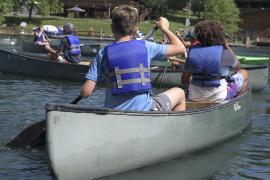It goes without saying that safety training is always an important priority at camp. Whether it's abuse prevention, aquatic, or transportation safety, or how to supervise effectively, it has always been critical that staff and counselors are equipped with the knowledge and skills they need to keep campers safe.
In 2021, however, that need is greater than ever. And that's because of several intersecting challenges:
- There's potential for fewer returning “veteran” staffers, who often serve as mentors to younger staff
- Those staff who are returning need additional practice and reminders (if they were unable to work at camp last year)
- Specific talent pools — such as international staff or teachers, for example — may be harder to access. This means the mix of skills and experience has changed, too.
- COVID-19 protocols may add additional layers of complexity or stress, potentially overshadowing trainings on other important topics
- And finally, campers may bring with them their own challenges, in the form of trauma, loss, or abuse at home, that may have been exacerbated by the stresses of the pandemic
That's why we believe that it will be critical for camps to redouble their training efforts, investing additional time and effort to make sure that trainings are not only taken — but that staff are retaining and applying the skills and knowledge they've acquired.
Adapting Training to Current Challenges
It will also be important to get out in front of who, exactly, is doing your trainings. If some training is virtual, for example, are your existing vendors set up to provide that experience, or do you need new ones? Can other local nonprofits — the YMCA for example — provide support for skills like lifeguarding? Remember, while virtual training may help alleviate some pressure, allowing time for staff to practice both hard and soft skills in person will be important as they head into the 2021 camp season.
Ultimately, the main thing to remember is that training is both more important and more demanding than it may have been in previous years, so you will need to budget and plan accordingly. If possible, schedule additional time for staff training, at a slower pace, to allow for COVID-related content to be incorporated into all of the topics you would need to cover anyway. Camps may also want to incorporate more training opportunities throughout the summer to keep things fresh — gradually shifting from skills practice to more coaching as the summer progresses. Morning meetings can be a great time, for example, to incorporate short discussion topics or trivia that simply help ensure that safety is front-of-mind at all times.
Free Online Camp Trainings
While there is no substitute for in-person training, online trainings can also be useful for helping your staff and volunteers prepare. Wherever possible, those online trainings should be specifically designed for the camp environment — making sure that the knowledge and skills imparted are not only accurate, but relevant to the unique circumstances of camp. Because of the challenges posed by COVID, as part of a relief effort, there are a few camp-specific trainings available at no cost to all camps:
A Safe Return to Camp
We know, of course, that no single solution is going to be enough to keep camp safe. As always, the real key to safety is applying multiple layers of protection — and ensuring a camp culture where safety is prioritized at all levels of the organization. That said, online training can provide a fantastic base of knowledge for your staff. And that base of knowledge can then be used as a foundation on which to build a culture where all campers are safe and protected. Given the year that everyone has just lived through, the camp experience will be a welcomed return to “normal” for many campers and their families. We hope to do our part to help make sure it's safe.
This blog was provided by The Redwoods Group.
Periodically, the American Camp Association (ACA) makes timely and relevant information about products and services available to its members so they can make informed decisions for their camps. However, the ACA does not endorse products, services, or companies.




